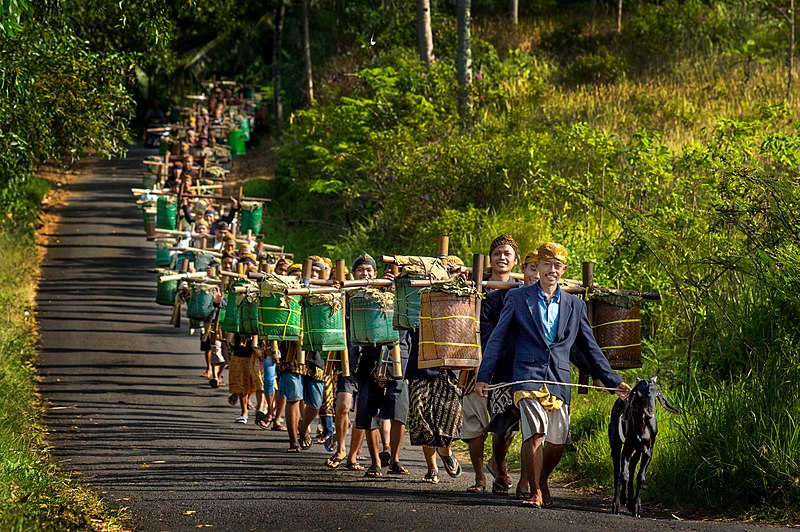Gotong-Royong

Credit: Giri Wijayanto
Licence: Creative Commons Attribution-Share Alike 4.0 International, via Wikimedia Commons
18 May 2017
| Giver: | Community |
|---|---|
| Receiver: | Individual or unstructured/informal group |
| Gift: | Other, Time |
| Approach: | Reciprocal Gift |
| Issues: | 10. Reduced Inequalities, 11. Sustainable Cities and Communities |
| Included in: | Mutual Aid |
Gotong-Royong refers to the principle of mutual cooperation at the core of Indonesian ethical life. The expression derives from the Javanese gotong, “to bear,” and royong, “together.” Although the principle of _gotong-royong _originated in the day-to-day practices of rural villages, it has come to symbolize the spirit of generosity at the heart of Indonesian identity.
Rooted in a shared commitment to prosperity, gotong-royong _calls upon all members of a community to work together for the common good. The idea of reciprocity is central to the practice of _gotong-royong. Community members understand they will come to each other’s aid in times of need, whether the occasion involves hosting an anniversary celebration or repairing a truck. No one keeps a formal accounting of individual contributions, but all community members share the expectation that everyone will give whatever they can.
While the term gotong-royong _has become widespread since the mid-twentieth century, few Indonesians used it prior to 1945, when the country gained its independence from Dutch colonial rule. Traditionally, different regions of Indonesia have used their own distinct languages to describe the concept of _gotong-royong. On the island of Java the word sambatan refers to the practice of working toward a shared goal. On Sumatra farmers use the term marsialapari to describe the collective planting and harvesting of grain, while neighbors on South Sulawesi come together to relocate entire houses in a ritual known as marakka bola.
In the post-colonial era, Indonesian politicians used _gotong-royong _as a slogan to unify the country’s diverse ethnic and cultural groups, elevating mutual assistance from a local custom into a national ethos. In 1945 the country’s first democratically elected president, Sukarno, formally declared _gotong-royong _to be the cornerstone of modern Indonesian society. Sukarno used this principle to justify his decision to dissolve the legislature and replace it with his hand-picked _Gotong-Royong _Parliament.
Succeeding Sukarno in 1967, Suharto exploited the concept of mutual cooperation to impose authoritarian control over rural life, centralizing agricultural development and imposing crop quotas according to the _gotong-royong _principle. Elected in 2014, President Joko Widodo has invoked the custom within the context of twenty-first century globalization, calling on Indonesia to exert its collective strength in order to achieve economic power.
Despite various efforts to co-opt _gotong-royong _for political purposes, it remains a core moral principle in Indonesia, where the practice of local giving continues to thrive. At the same time, _gotong-royong _has become a vital source of national pride — a reminder for all Indonesians that generosity forms the backbone of their diverse modern society.
Contributors: Maha Tazi, Stephen Meyer
| Source type | Full citation | Link (DOI or URL) |
|---|---|---|
| Publication |
Bowen, John R. “On the political construction of tradition: Gotong Royong in Indonesia.” The Journal of Asian Studies 45, no. 3 (1986): 545-561. |
- |
| Publication |
Mardiasmo, Asti, and Paul Barnes. “Community Response to Disasters in Indonesia: Gotong Royong; a Double Edged-Sword”. In Proceedings of the 9th Annual International Conference of the International Institute for Infrastructure Renewal and Reconstruction, edited by P. Barnes and A. Goonetilleke. Queensland University of Technology, 2015 |
http://digitalcollections.qut.edu.au/2213/. |
| Publication |
Prasetiyo, Ari. “The Phenomenon of Gotong Royong in Java Community: A Case Study of Nyumbang”. Indonesian Journal of Multidisciplinary Science 1 no. 7 (2022): 792–801. |
https://doi.org/10.55324/ijoms.v1i7.145. |
| Website |
“President Jokow: Gotong Royong Strategy Is Key to Facing Global Competition”.Sekretariat Kabinet Republik Indonesia, 2022. |
https://setkab.go.id/en/president-jokowi-gotong-royong-strategy-is-key-to-facing-global-competition/. |
| Publication |
Suwignyo, Agus. “Gotong royong as social citizenship in Indonesia, 1940s to 1990s.” Journal of Southeast Asian Studies 50, no. 3 (2019): 387-408. |
- |